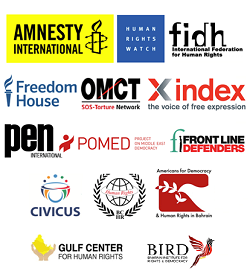15 January 2015 – This week, 16 human rights organisations have written to 47 States to express grave concern ahead of a 20 January verdict in the trial of Nabeel Rajab, a prominent Bahraini human rights defender.
Please click here for a PDF of this statement.
Additionally, Americans for Democracy and Human Rights in Bahrain, The Bahrain Center for Human Rights and The Bahrain Institute for Rights and Democracy sent letters to United Nations officials and Members of Parliament in all 47 States urging them to publicly call on the Government of Bahrain to drop all charges against Rajab.
On 1 October 2014, Rajab reported to the Cyber Crimes Unit of Bahrain’s General Directorate of Criminal Investigations (CID) after being summoned for questioning. Following hours of interrogation in relation to a tweet he published while abroad, Rajab was arrested. The tweet read: “Many #Bahrain men who joined #terrorism & #ISIS came from security institutions and those institutions were the first ideological incubator.”
For this tweet, Rajab was charged with insulting the Ministries of Interior and Defense under article 216 of Bahrain’s penal code, which states that “A person shall be liable for imprisonment or payment of a fine if he offends by any method of expression the National Assembly, or other constitutional institutions, the army, law courts, authorities or government agencies.” Rajab was released on bail on 2 November, but was banned from traveling outside the country. If found guilty, he could face up to six years in prison.
The charges leveled against Rajab are illegal under Bahrain’s commitments to the international community and international human rights law. Bahrain is party to the International Covenant on Civil and Political Rights (ICCPR), having acceded to the covenant in 2006. Article 19 of the ICCPR provides everyone with the fundamental rights to opinion and expression. Further, international jus cogens norms protect against the arbitrary deprivation of liberty, especially in relation to acts related to free expression. By prosecuting Rajab for statements that he made over Twitter, the Bahraini government violates its own commitments to the international community.
The ongoing suppression of basic human rights in Bahrain has drawn heavy criticism from the international community. In June 2014, 47 United Nations Member States signed a joint statement on Bahrain expressing concern “about the continued harassment and imprisonment of persons exercising their rights to freedom of opinion and expression, including human rights defenders.” The statement also called on Bahrain to “release all persons imprisoned solely for exercising human rights, including human rights defenders.” In 2014 a European Parliament resolution also called for “the immediate and unconditional release of all prisoners of conscience, political activists, journalists, human rights defenders and peaceful protesters, including Nabeel Rajab. …”
The undersigned NGOs close the letter by urging the international community to explicitly and publicly call for the Government of Bahrain to immediately drop all charges against Rajab and the many others currently facing charges or serving arbitrary jail sentences for exercising their rights to freedom of expression, association and assembly.
NGO signatories:
Amnesty International
CIVICUS
English Pen (Letter to the UK Foreign Office only)
Freedom House
Front Line Defenders
Human Rights Watch
Index on Censorship
Pen International
Project on Middle East Democracy
Rafto Foundation for human rights (Letter to the Norwegian Ministry of Foreign Affairs only)
FIDH in the framework of the Observatory for the Protection of Human Rights Defenders
OMCT in the framework of the Observatory for the Protection of Human Rights Defenders
Americans for Democracy and Human Rights in Bahrain
Bahrain Center for Human Rights
Bahrain Institute for Rights and Democracy
Gulf Center for Human Rights
Additional Background:
Nabeel Rajab is the President of the Bahrain Center for Human Rights, Deputy Secretary General of the International Federation for Human Rights (FIDH), and a member of Human Rights Watch’s Middle East Advisory Board.
Bahraini authorities have previously prosecuted Rajab on politically motivated charges. They have never presented any credible evidence that Rajab has advocated, incited or engaged in violence.
Rajab was detained from May 5 to May 28, 2012, for Twitter remarks criticizing the Interior Ministry for failing to investigate attacks carried out by what Rajab said were pro-government gangs against Shia residents. On 28 June 2012, a criminal court fined him 300 Bahraini Dinars (US$790) in that case.
Authorities again detained Rajab on 6 June 2012, for another Twitter remark calling for Prime Minister Khalifa bin Salman al Khalifa to step down. On 9 July 2012, a criminal court convicted and sentenced him to three months in prison on that charge. A court of appeal overturned that verdict, but in a separate case a criminal court sentenced him to three years in prison for organizing and participating in three unauthorized demonstrations between January and March 2012. An appeals court reduced the sentence to two years, which Rajab completed in May 2014.
In September 2014, Rajab traveled to Europe to call for stronger international action on Bahrain. He met with representatives of various European governments and the EU, spoke to the media, and addressed UN fora.
In the current case, Rajab was detained on 1 October 2014, within 24 hours of his return to Bahrain.





